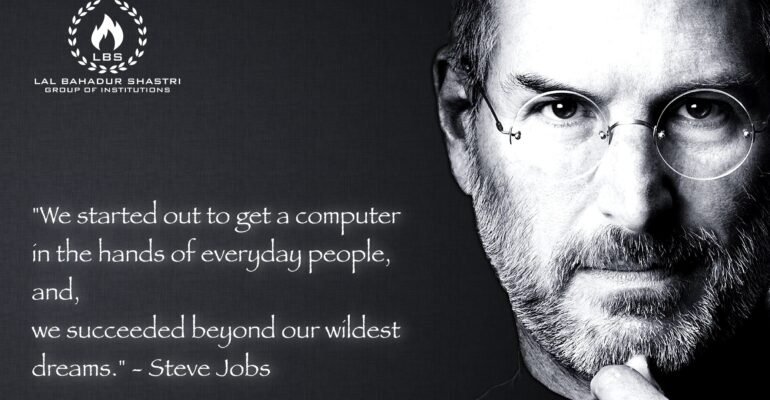<a href="javascript:void(0);">APPLE AFTER JOBS</a>
Apple lost its visionary founder Steve Jobs in 2011. Even after 7 years of his death, the question that looms in everyone’s mind from shareholders, to competitors, to employees & of course customers is that will Apple under Tim Cook be able to sustain its position as a market leader.
“We started out to get a computer in the hands of everyday people, and we succeeded beyond our wildest dreams.” ~ Steve Jobs
It is common knowledge that Apple was co-founded in 1976 by Steve Jobs and Steve Wozniak. Many regard Jobs as the Father of “The PC Revolution”. In 1985, Apple began to struggle after its board ousted Steve Jobs from the company. After about 10 years of declining sales creating conditions of bankruptcy, Apple desperately turned to its visionary founder for help, and a little older and wiser Jobs returned back in 1997 and designed one of the most amazing turnarounds of the 20th century. Jobs led Apple to a spectacular recovery, introducing the iPod in 2001, the iPhone in 2007, and the iPad in 2010.
When Jobs came on board, Apple was still very much a niche computer platform. Windows-based PCs ruled the market, with the higher-priced Apple computers primarily being used by the specialists in industries like advertising, design and motion pictures. When Apple launched the iPhone in 2007, it became a breakthrough product which not only catapulted Apple to becoming a major player but also a company everyone was trying to emulate. Overnight, the iPhone reinvented cell phone technology, and it was yet another humongous victory for Steve Jobs after the iPod.
Apple’s success is due in large part to its obsessive focus on the user experience. Apple is a designer-centric company that likes to build all parts of a product — hardware, software, and online services — itself. That approach has allowed Apple to build some of the most elegant and user-friendly products ever created.
Steve Jobs died of pancreatic cancer in 2011. Tim Cook was appointed as the CEO of Apple on August 24, 2011. Before he died, Jobs warned Cook against trying to run Apple by asking how Jobs would have handled each decision. “Just do what’s right,” Jobs said.
Apple under Jobs was a product-driven company with excellent marketing. Apple under Cook has become a marketing-driven company with mediocre products. Marketing experts say that “Instead of delivering highly innovative products that the customers did not even think of in the wildest of their imagination, Apple now dabbles with past successes and exploits them for as long as possible”. Apple’s products post Jobs have primarily undergone upgrades rather than the introduction of any new product designs.
The brilliance of Jobs was when he introduced a product, it wasn’t always the first of its kind — but it was always better. As a result, Apple could and did command a premium which customers were willing to pay more than willingly for the product’s superiority. In fact, customers would eagerly wait for Jobs to come up with new products & many would queue up to buy them irrespective of the price because they were sure that Apple would be first to drive improvements that would be definitely far ahead of the competition.
Under the leadership of Steve Jobs, Apple had 14 products but now Apple has 27 products with more than 200 variety of different versions. He moved away from Steve Jobs minimalist strategy and reached amazing growth of Apple by doubling the products. But it’s true that there are only a few innovative products that have been launched during the 6 years tenure of Tim Cook. Job’s minimalistic strategy ensured that Apple’s products, business, and marketing all aligned with this idea.
To be fair to Cook, it is extremely difficult, if not impossible to outshine your predecessor especially if he happens to be a revolutionary & dynamic man like Steve Jobs. It is good that Cook has charted his own course as Jobs had advised him because he couldn’t have thought like Jobs as there was only one Jobs like there is only one Cook. He needed to think & strategize on his own, which he did & is doing but it is also imperative for him to ensure that Apple does not slip down from the place where Jobs had placed it.
All in all, Apple has indeed seen a decrease in momentum since the loss of their founder and chief creative visionary. Despite this, their popularity has only increased. The challenge before Cook is how to sustain the Apple brand that Jobs built and demand premium pricing when better or comparable products are available from the competition for less. The big question today is, will Apple ever bring to market a product that was as revolutionary as the iPhone, iPod, or iPad? What is worth noting here is that in all of those instances, products having similar functions already existed in the market. What Apple and Steve did was to add features which the customers wished for & in many cases had not even thought of. The constraint is that unlike in 1997, this time Apple does not have a safe bet called Jobs to fall back upon.
Author
Dr. Tripti Barthwal
Director, LBSIMDS
(She holds more than 20 years of teaching & research experience besides being Trainer & Consultant to several Government Departments, PSUs & Banks.)
“We started out to get a computer in the hands of everyday people, and we succeeded beyond our wildest dreams.” ~ Steve Jobs
It is common knowledge that Apple was co-founded in 1976 by Steve Jobs and Steve Wozniak. Many regard Jobs as the Father of “The PC Revolution”. In 1985, Apple began to struggle after its board ousted Steve Jobs from the company. After about 10 years of declining sales creating conditions of bankruptcy, Apple desperately turned to its visionary founder for help, and a little older and wiser Jobs returned back in 1997 and designed one of the most amazing turnarounds of the 20th century. Jobs led Apple to a spectacular recovery, introducing the iPod in 2001, the iPhone in 2007, and the iPad in 2010.
When Jobs came on board, Apple was still very much a niche computer platform. Windows-based PCs ruled the market, with the higher-priced Apple computers primarily being used by the specialists in industries like advertising, design and motion pictures. When Apple launched the iPhone in 2007, it became a breakthrough product which not only catapulted Apple to becoming a major player but also a company everyone was trying to emulate. Overnight, the iPhone reinvented cell phone technology, and it was yet another humongous victory for Steve Jobs after the iPod.
Apple’s success is due in large part to its obsessive focus on the user experience. Apple is a designer-centric company that likes to build all parts of a product — hardware, software, and online services — itself. That approach has allowed Apple to build some of the most elegant and user-friendly products ever created.
Steve Jobs died of pancreatic cancer in 2011. Tim Cook was appointed as the CEO of Apple on August 24, 2011. Before he died, Jobs warned Cook against trying to run Apple by asking how Jobs would have handled each decision. “Just do what’s right,” Jobs said.
Apple under Jobs was a product-driven company with excellent marketing. Apple under Cook has become a marketing-driven company with mediocre products. Marketing experts say that “Instead of delivering highly innovative products that the customers did not even think of in the wildest of their imagination, Apple now dabbles with past successes and exploits them for as long as possible”. Apple’s products post Jobs have primarily undergone upgrades rather than the introduction of any new product designs.
The brilliance of Jobs was when he introduced a product, it wasn’t always the first of its kind — but it was always better. As a result, Apple could and did command a premium which customers were willing to pay more than willingly for the product’s superiority. In fact, customers would eagerly wait for Jobs to come up with new products & many would queue up to buy them irrespective of the price because they were sure that Apple would be first to drive improvements that would be definitely far ahead of the competition.
Under the leadership of Steve Jobs, Apple had 14 products but now Apple has 27 products with more than 200 variety of different versions. He moved away from Steve Jobs minimalist strategy and reached amazing growth of Apple by doubling the products. But it’s true that there are only a few innovative products that have been launched during the 6 years tenure of Tim Cook. Job’s minimalistic strategy ensured that Apple’s products, business, and marketing all aligned with this idea.
To be fair to Cook, it is extremely difficult, if not impossible to outshine your predecessor especially if he happens to be a revolutionary & dynamic man like Steve Jobs. It is good that Cook has charted his own course as Jobs had advised him because he couldn’t have thought like Jobs as there was only one Jobs like there is only one Cook. He needed to think & strategize on his own, which he did & is doing but it is also imperative for him to ensure that Apple does not slip down from the place where Jobs had placed it.
All in all, Apple has indeed seen a decrease in momentum since the loss of their founder and chief creative visionary. Despite this, their popularity has only increased. The challenge before Cook is how to sustain the Apple brand that Jobs built and demand premium pricing when better or comparable products are available from the competition for less. The big question today is, will Apple ever bring to market a product that was as revolutionary as the iPhone, iPod, or iPad? What is worth noting here is that in all of those instances, products having similar functions already existed in the market. What Apple and Steve did was to add features which the customers wished for & in many cases had not even thought of. The constraint is that unlike in 1997, this time Apple does not have a safe bet called Jobs to fall back upon.
Author
Dr. Tripti Barthwal
Director, LBSIMDS
(She holds more than 20 years of teaching & research experience besides being Trainer & Consultant to several Government Departments, PSUs & Banks.)
Related Posts
THE TOP-EIGHT BUILDING BLOCKS OF LBS GROUP OF INSTITUTIONS
Dec 28, 2022
305 views
TOP TEN BUSINESS NEWS OF 2018
Dec 28, 2022
1,636 views
6 BUSINESS IDEAS TO INSPIRE THE ENTREPRENEUR INSIDE YOU
Dec 28, 2022
452 views
ATTITUDE VIRUS – A THREAT TO ORGANISATIONS
Dec 28, 2022
510 views









